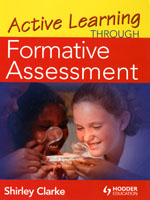Active Learning through Formative Assessment
By Shirley Clarke
October 2011
Hodder Education
Distributed by the Trans-Atlantic Publications
ISBN: 9780340974452
172 Pages, Illustrated
$62.50 Paper original

Shirley Clarke's latest book, following her hugely popular Formative Assessment in Action (2005), puts formative assessment within the context of active learning - maximising pupil engagement, effective dialogue and reflective thinking - and is packed with practical advice and examples from early years to secondary, across all subjects.
Central to the whole process of using assessment for (and as) learning is the way in which pupils become involved in all learning and assessment processes: the explanations and classroom examples in this book demonstrate why and how to do it. Drawn from across the age range, and all subjects, they exemplify effective learning objectives, clear success criteria, talk partner techniques, effective questioning, quality discussion with pupils, and self- and peer evaluation of work.
New themes include how to develop a growth mindset, so that pupils enjoy challenge rather than avoid it for fear of failure; how popular strategies such as thinking skills and building learning power complement formative assessment; advice on current national expectations for summative assessment; and planning with key skills. Shirley also explains how to set up your own action research learning team in an individual school, a cluster of schools or any other educational setting and how best to support classroom teachers in their journey through the culture and practice of formative assessment.
Down to earth, practical and direct, this book gives busy teachers the essential 'how to' information they need, with clear principles and theory to underpin the wealth of practical advice and examples.
- Takes forward Shirley Clarke's hugely popular Formative Assessment in Action (2005) and Unlocking Formative Assessment (2001)
-
Explains how to use formative assessment to promote active learning, in primary and secondary classrooms
-
Gives busy teachers the 'how to' information they need: down to earth, practical and direct
-
Well-chosen examples flag up the practical 'implementation' issues across the full age and subject range.
-
A 'must have' for every local authority assessment adviser and every school assessment coordinator, and for classroom teachers across England, Wales and Scotland
-
Produced in full colour, to do full justice to the numerous classroom examples and enhance the text.
Table of Contents:
![]() Introduction
Introduction
![]() 1 Definitions, history and purposes of formative assessment
1 Definitions, history and purposes of formative assessment
![]() 2 The link with summative assessment: long-, medium- and short-term assessment
2 The link with summative assessment: long-, medium- and short-term assessment
![]() 3 The ideal learning culture
3 The ideal learning culture
![]() 4 How can we maximise opportunities to think, discuss and question?
4 How can we maximise opportunities to think, discuss and question?
![]() 5 Asking worthwhile questions
5 Asking worthwhile questions
![]() 6 How can planning maximise pupil engagement and achievement?
6 How can planning maximise pupil engagement and achievement?
![]() 7 What makes effective learning objectives?
7 What makes effective learning objectives?
![]() 8 How will we know what learning objectives mean?
8 How will we know what learning objectives mean?
![]() 9 How will we know what excellence looks like?
9 How will we know what excellence looks like?
![]() 10 How can we enable a process of constant review and improvement?
10 How can we enable a process of constant review and improvement?
![]() 11 Setting up a learning team in your own educational setting, and supporting teacher development
11 Setting up a learning team in your own educational setting, and supporting teacher development
![]() References
References
Return to main page of Trans-Atlantic Publications